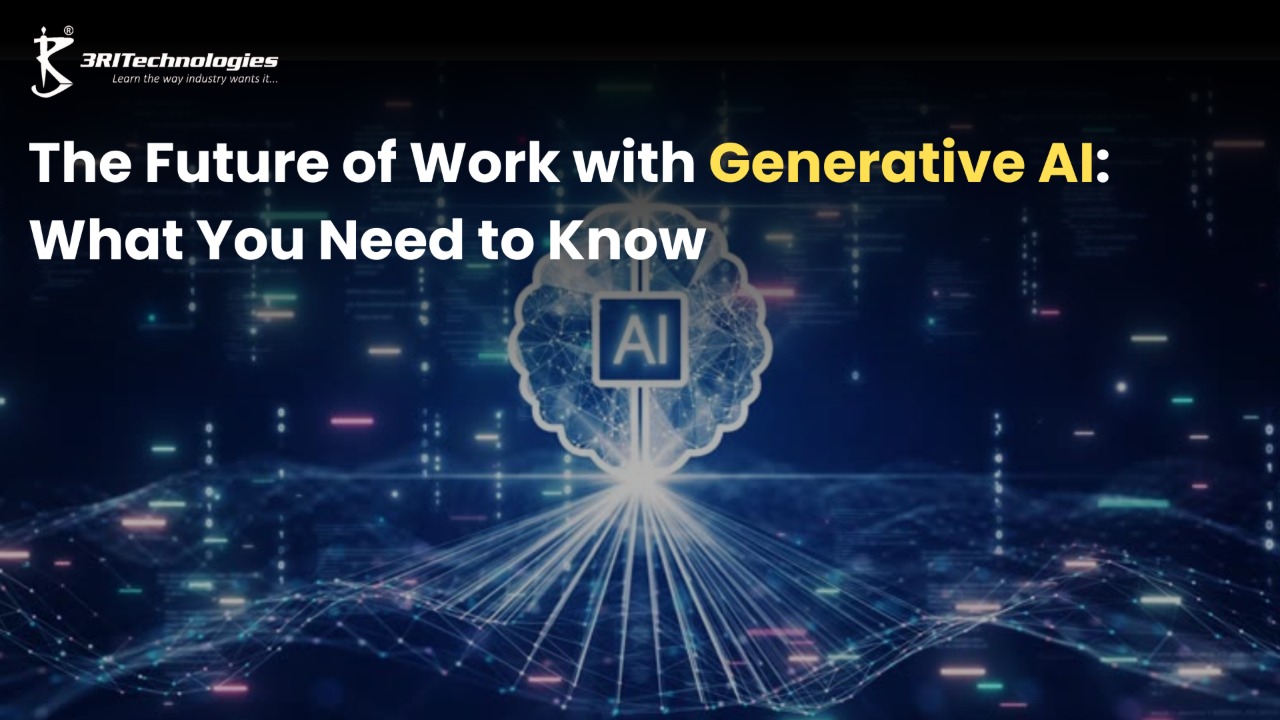Introduction: The AI-Powered Work Era Is Here
From automating repetitive tasks to boosting creativity, Generative AI is reshaping how businesses operate and how professionals grow. Whether you’re an IT student, developer, analyst, or tech enthusiast, understanding this shift is no longer optional—it’s essential for career growth.
The future of work is rapidly evolving with the rise of Generative AI, reshaping how businesses operate and how professionals upskill. From automating repetitive tasks to enhancing decision-making, AI is creating new opportunities for those equipped with the right skills. Many learners today search for Data analytics training near me or explore data analytics courses near me to stay competitive in this AI-driven world. If you’re planning a career in this field, understanding data science course eligibility is the first step toward building expertise. For professionals in Pune, choosing the best institute for data science in Pune ensures quality training, practical exposure, and future-ready career growth in the era of Generative AI.
Want to stay ahead in this AI-driven world? Explore our hands-on Generative AI training programs designed for real-world success.

What Is Generative AI?
Generative AI refers to AI models that can create content—text, images, code, music—based on patterns and inputs. Tools like ChatGPT, Midjourney, and GitHub Copilot are already becoming co-workers in digital workflows.
Why It Matters
Generative AI is more than just a productivity tool—it’s a transformative force in the modern workplace. By automating repetitive and time-consuming tasks, it significantly cuts down manual work and boosts innovation, allowing teams to focus on high-impact projects. Moreover, it enhances decision-making with faster data processing, giving businesses a competitive edge through real-time insights and predictions. Perhaps most importantly, it frees humans to focus on creativity and strategy, shifting the nature of work from mechanical execution to ideation and innovation. This evolution makes AI fluency a must-have skill for professionals looking to remain relevant and future-proof.
- Cuts down manual work and boosts innovation
- Enhances decision-making with faster data processing
- Frees humans to focus on creativity and strategy
Top Trends Shaping the Future of Work
1. AI Adoption Is Accelerating Rapidly
According to Microsoft, over 75% of professionals now use AI tools weekly, if not daily. That means employees who understand AI will have a competitive edge.
Curious how to leverage AI like a pro? Start learning Prompt Engineering and AI ethics today.
2. Human-AI Collaboration Is the New Normal
The goal isn’t to replace jobs but to enhance human potential. AI helps reduce burnout from repetitive tasks so professionals can spend more time on impactful work.
Job Roles Most Affected (and Created)
| Role Impacted | How AI Changes It | Future Outlook |
| Data Entry/Clerical | Fully automated | High risk – shift to data validation |
| Content Writing | Assisted by AI copy tools | Medium risk – human creativity still key |
| Software Development | Code autocompletion with AI | Low risk – AI complements human coders |
| Prompt Engineer | New AI-powered role | High demand, high pay |
| AI Ethicist | Ensures responsible AI use | Growing role in enterprises |
Looking to switch to a high-growth career path? Discover careers like AI Analyst, Prompt Engineer & more with industry-aligned certification.
Skills You’ll Need in the AI Age
As AI tools become embedded in everyday workflows, professionals must adapt by acquiring both technical and human-centric skills. Understanding how AI models work, like Large Language Models (LLMs) and Natural Language Processing (NLP), is key to using them effectively. Mastering prompt engineering ensures you can get accurate, useful results from AI tools. Foundational knowledge in Python and data literacy adds immense value. But success in the AI era also requires soft skills—critical thinking, ethical awareness, and strong communication—to collaborate, supervise AI systems, and ensure outputs are responsibly used in real-world scenarios.
Must-Have Technical Skills
- Understanding how AI tools work (e.g., LLMs, NLP)
- Prompt engineering to interact with AI effectively
- Python basics and data literacy
Essential Soft Skills
- Critical thinking for interpreting AI outputs
- Ethical awareness to spot AI bias or misuse
- Communication to collaborate with humans and machines
Not sure where to begin? Join our AI Bootcamp for beginners to get started with interactive, job-ready training.
How Businesses Are Adapting to AI
Forward-thinking businesses are not just adopting AI—they’re restructuring their workflows to integrate it meaningfully. From streamlining internal operations to reimagining customer experiences, AI is becoming a key strategic asset. Companies are running pilot programs, training staff on AI tools, and investing in upskilling initiatives to bridge the skills gap. There’s also a strong focus on ethical AI use and data governance to ensure responsible deployment. Many organizations are creating hybrid roles where humans and AI systems collaborate for better efficiency and innovation. This shift is increasing the demand for AI-literate professionals who can effectively guide and manage intelligent systems.
To stay competitive in an AI-first economy, many companies are proactively transforming their workforce strategies. One major shift involves redesigning job roles to incorporate AI collaboration, allowing employees to offload repetitive tasks and focus on strategic thinking and innovation. Organizations are also investing heavily in upskilling programs, helping their current workforce develop essential AI literacy, prompt engineering, and data handling skills. In hiring, there’s a clear preference for professionals with hybrid tech + AI capabilities—individuals who can bridge traditional IT roles with emerging technologies. This trend reflects a long-term commitment to building agile, future-ready teams equipped to work alongside intelligent systems.
Many companies are:
- Redesigning jobs to include AI collaboration
- Investing in upskilling programs for current employees
- Hiring professionals with hybrid tech+AI skills
Want your resume to reflect these in-demand skills? Enroll in our AI Skills Certification with live project experience and job support.
Why IT Training Matters Now More Than Ever
Whether you’re a college student or a mid-career professional, upskilling in AI can be your greatest asset. Companies are increasingly hiring candidates who are AI-literate and capable of adapting to new tools quickly.
In the age of generative AI and rapid digital transformation, IT training isn’t just valuable—it’s vital. As job roles evolve, companies are prioritizing candidates who can adapt quickly, work alongside AI tools, and solve complex problems with technology. Whether you’re an aspiring developer, data analyst, or IT support professional, upskilling through structured IT training equips you with the technical and strategic capabilities needed to stay competitive. More than just learning tools, it empowers you to drive innovation, lead AI adoption, and future-proof your career in a constantly shifting job landscape.
Our AI & Tech Certification Courses include:
• Real-time Projects with Expert Mentors: Hands-on learning is the heart of our training approach. You’ll work on live industry-level projects guided by experienced mentors who bring real-world insights. This practical exposure ensures you’re not just learning theory but applying your skills to solve actual business problems—boosting both your confidence and your portfolio.
• Interview Preparation with Mock Sessions: Landing a job isn’t just about skills—it’s about how you present them. We conduct mock interviews with industry professionals to prepare you for real hiring scenarios. You’ll receive personalized feedback on your communication, technical answers, and body language, helping you ace interviews with ease.
• Industry-Recognized Certification: Upon course completion, you’ll receive a professional certificate that’s recognized across the tech industry. Whether you’re applying for a job, switching roles, or freelancing, this credential adds credibility and shows employers you’ve mastered in-demand AI and tech skills.
• Free Trial Classes and Flexible Batches: We understand your schedule matters. That’s why we offer free trial sessions so you can explore our teaching quality before committing. Plus, with weekend, weekday, and evening batch options, you can choose what fits best with your routine—without compromising your current job or studies.
Start for free today and build a career-proof skill set! Join our free trial.
Real Examples: How AI Is Already Changing Work
Example 1: Software Teams
Developers now use AI to generate code snippets, debug functions, and even write test cases—reducing delivery time by 30%.
Example 2: Content Marketing
Marketers use AI for keyword research, content ideas, and email campaigns—freeing time for strategy and personalization.
Want hands-on practice with these tools? Try our Generative AI Lab Sessions and get mentored by industry professionals.
Common Challenges with Generative AI (And How to Overcome Them)
| Challenge | Solution |
| Fear of job loss | Upskill and shift to AI-enhanced roles |
| Data privacy concerns | Learn AI ethics and responsible AI practices |
| Lack of AI knowledge | Join certified training programs that include real-world AI projects |
Ready to face these challenges head-on? Get AI-ready with our job-oriented IT courses.
What the Future Holds: Forecast & Advice
As AI continues to evolve, it will become deeply integrated into nearly every job function—whether in development, data analysis, design, or management. By 2030, roles will increasingly involve human-AI collaboration, and professionals will be expected to work alongside intelligent tools to boost efficiency and creativity. The workforce of the future won’t just rely on hard tech skills, but on adaptability, ethical judgment, and continuous upskilling. To stay competitive, individuals must invest in AI literacy, embrace lifelong learning, and stay updated with industry trends. The key to success will be not resisting change—but learning how to lead it.
By 2030, AI will be a part of almost every job—either as a collaborator, coach, or creative assistant. This means:
• Job Descriptions Will Evolve: In the AI-driven workplace, job roles are no longer confined to rigid responsibilities. Employers are rewriting job descriptions to include familiarity with AI tools, data interpretation, and the ability to work in tech-enhanced environments. A content writer, for instance, might also be expected to use generative AI for idea generation or editing. This shift requires professionals to be versatile, adaptable, and comfortable using intelligent systems as part of their daily tasks.
• Hybrid Roles Will Become Common: Traditional job boundaries are blurring, giving rise to hybrid roles that combine technical and non-technical skills. You may find marketers who code, HR managers who analyze data, or designers who prompt AI for visuals. These roles demand both domain knowledge and a working understanding of tools like ChatGPT, Midjourney, or AI analytics platforms. Those who can blend creativity, strategy, and tech-savviness will lead the way in the modern workforce.
• Continuous Learning Will Be Non-Negotiable: The pace of AI innovation is relentless—new tools and updates roll out every few months. To keep up, professionals will need to commit to lifelong learning. Static skill sets won’t be enough. Upskilling in AI, cloud computing, data analytics, or cybersecurity will be essential just to stay competitive, let alone advance. Institutions and employees alike must embrace a mindset of continuous learning to remain agile in the face of technological change.
Be part of the future, not behind it. Start your AI learning journey today with our expert-led courses designed for professionals and beginners alike.
Final Thoughts: Adapt, Upskill, Succeed
The future of work is not just about AI replacing jobs—it’s about humans evolving with AI. Whether you want to become an AI Prompt Engineer, enhance your current IT role, or break into the tech industry, the right training can make all the difference.
Future-proof your career in just a few weeks. Join our AI-powered IT Certification Program and take the first step toward smarter, faster, more meaningful work.






